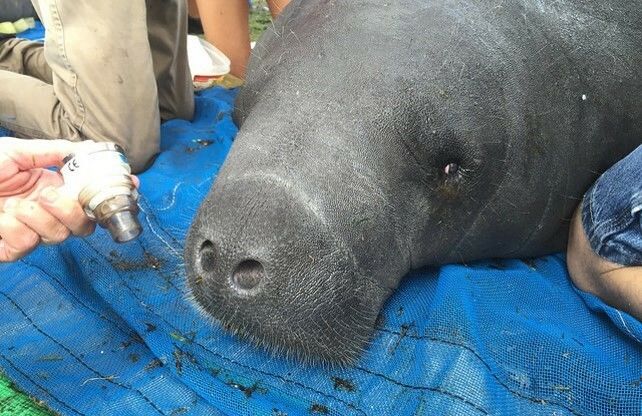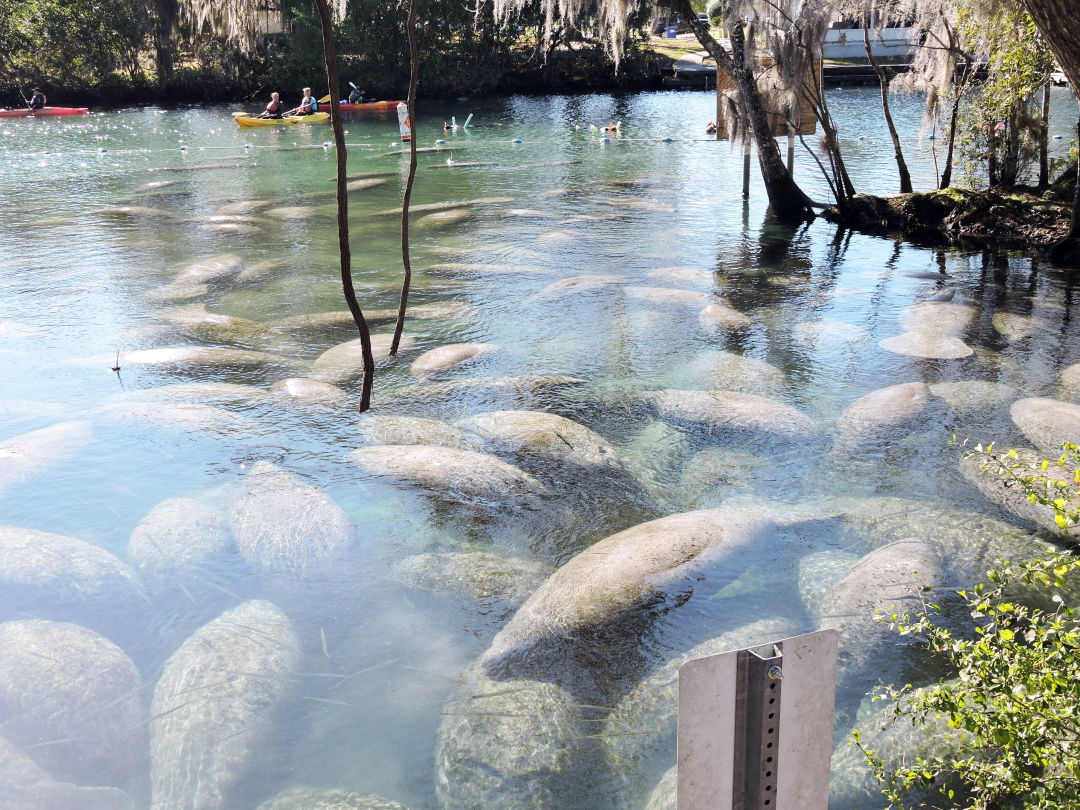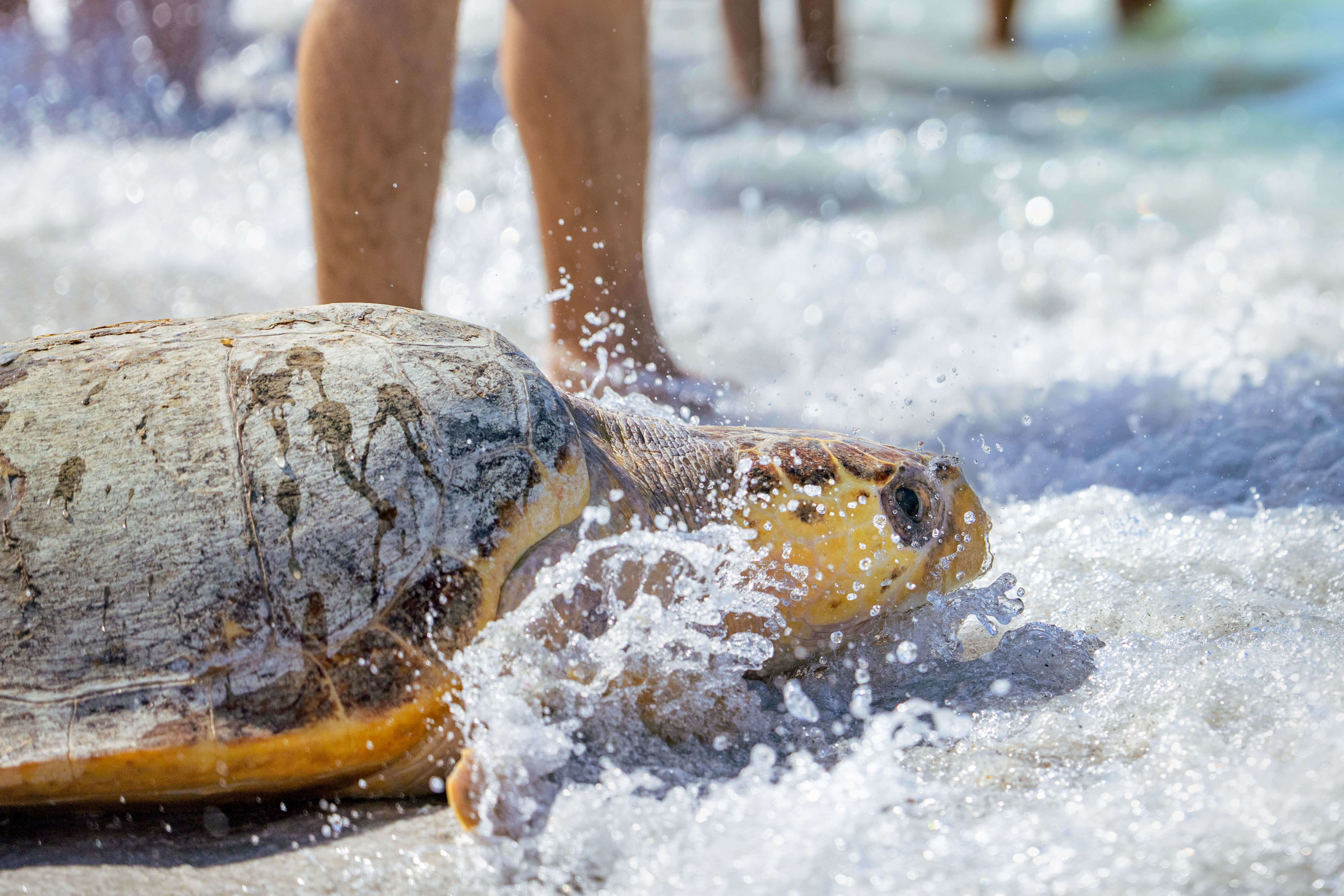Red Tide Is Affecting Manatees. What We Can Do to Help?

If persistent red tide conditions are making you feel unwell and somewhat hopeless, you're not alone. But when it comes to manatees—who are suffering even more than we are from the algal bloom—there are things we can do to help.
"Boaters are our eyes on the water," says Andy Garrett, the statewide manatee rescue and recovery coordinator for the Florida Fish and Wildlife Conservation Commission (FWC).
Manatees are hearty and robust survivalists—to a point. For example, Florida manatees have enough boat scars to serve as fingerprints for individual identification. They don’t always survive a boat strike, but if they're treated right away, they are often very responsive to rehabilitation from many different kinds of stressors or injuries. When it comes to red tide, manatees suffer visible distress before it proves fatal, and they can survive if attended to quickly and given a chance to metabolize the toxins.
That's where boaters come in. An alert boater can easily identify distressed manatee behavior if they recognize the signs.
Manatees eat seagrass, and when that seagrass is loaded with Karenia brevis, the bacteria that causes red tide, they become intoxicated with a neurotoxic compound called brevotoxin that causes them to behave strangely. That intoxicated behavior will look odd even to those who are unfamiliar with manatees, Garrett says.
He describes intoxicated manatees as having "uncontrolled buoyancy, this could be an animal that’s rolling. We see sometimes they kind of pirouette, where they’ll have their head out of the water—almost like a dolphin—and they’ll spin around. They'll look drunk and have uncoordinated movements, or they’ll be lethargic, to the point where you can basically just go up to them and push them and they won’t even react." (Do not do this, Garrett warns, unless you're on the phone with FWC and the responder asks you to approach the animal.)
He describes other concerning behaviors in which manatees are seen "kind of inverted, or vertical, in the water column. Manatees are usually horizontal when they come up to breathe." In the event of red tide intoxication, their tails could be sticking up and their noses facing down. "That’s just a really weird body orientation," says Garrett. "It doesn’t look right."
Finally, you could see manatees experiencing symptoms of seizure from the red tide neurotoxins. "You’ll see their head go up and their tail make a weird arch when they come to breathe," says Garrett. If a manatee is seizing, they’ll be stuck in that U-shape for a while. Their large jowls can also become distorted. With brevetoxin exposure, their faces "will be just wrinkled and frozen in a weird way, kind of snarled up," Garrett says.
View this post on Instagram
The eventual intensification of brevotoxin poisoning results in paralysis, which is often temporary. In many cases, manatees drown in this paralyzed state if their head is not above the water where they can continue to breathe until their bodies can process and metabolize the toxin.
If you see a manatee in distress, call the FWC at (888) 404-FWCC (3922). The FWC team can talk you through how to attend to the animal while a dispatcher heads to the location, just like we would do when we call 911.
Calling first is not only for the manatee’s safety, it’s for human safety, too. Manatees are massive and can buck and cause harm to those nearby. These peaceful creatures have a lot of power and, in their healthy states, they don’t like to be approached or held in place.
That said, some intoxicated sea cows have been found in shallow waters and do not react or move away when approached—this is a bad sign for the manatee, Garrett says. The FWC operator will likely ask the caller if they are willing to get into the water and talk them through how to keep the manatee’s head up so the sea cow can breathe while it processes the toxin. Once an FWC responder arrives at the scene, they can do further testing or assess if they need to bring the animal to a rehabilitation facility.

Manatees congregate in a sanctuary spot.
There is some good news, though: this year, there are fewer manatees critically suffering from the Unusual Mortality Event (UME) that's been occurring in Florida since 2020, which means the FWC has more responders available to attend to animals in distress in other areas. Boaters can also have a major impact on manatee health and survival by cruising safely and avoiding shallow waters and seagrass beds.
For a longer-term solution to red tide, getting our state's fertilizer use in check and picking up after our dogs will get us closer to keeping our waters healthy for ourselves, visitors and marine life alike.
Florida is the only place in the world where manatees can live without fear of being hunted. However, even here, their numbers are dwindling to the point where every life matters for the species to survive.
“We’re probably at 64-ish deaths from Manatee County up to the Panhandle, and south of that, deaths are probably in the 70s for the year," Garrett says. "Those numbers include manatee deaths from all causes. They're higher than our five-year average for this time of year."
If you're out on the water, keep your eye out for sea cow footprints—their swimming style causes round upwellings in the water surface that look a bit like an invisible rock skipping across the water. Always call the FWC if you see a manatee that looks odd in any way, or if you find a carcass.
General Manatee Awareness Tips for Boaters
- Wear polarized sunglasses, which reduce glare, making it easier to see people, marine life or objects beneath the surface of the water
- Know the zones for speed regulations to avoid producing wakes and seagrass beds.
- Post a lookout to spot wildlife, other boaters, swimmers sand bars or seagrass beds.
- Save marine life by properly discarding or recycling fishing lines and plastics and use a circle or non-stainless steel hooks to prevent wildlife death by ingestion.
If you see a manatee that appears to be in distress, call (888) 404-FWCC (3922). For more information and to explore other signs of manatee distress visit FWC.gov.



